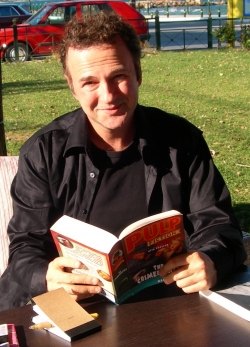Sarcasm
a type of irony in which a person appears to be praising something but is actually insulting it. Its purpose is to injure or to hurt.
Homograph Hymn
Tony Barnstone
Last year I dropped off thirty pounds, content
to live my salad days on lettuce, raven-
ously unfilled, or unfulfilled, the content
of my poor heart a wish, a croaking raven
from someone else's poem, an unwound
dockline, a white-winged sailboat in the wind
that tacked out of my life. Now I'm a wound,
and you a nevermore, and nights unwind
towards dawn with dreams that scavenge like a dove
whose manic B-B eye seeks through the refuse
for you. Today I ate some air then dove
back into bed alone. I won't refuse
the slightest anorexic hope. I close
my eyelash wings. No black bird brings you close.
Tony Barnstone’s “Homograph Hymn” is full of sarcasm. Barnstone writes like an anorexic who is talking about his lack of eating, and the horrible days he’s had. “Today I ate some air then dove back into bed alone. I won’t refuse the slightest anorexic hope.” He alludes to Edgar Allan Poe’s “The Raven” throughout this poem, which contributes to the sarcasm. In “The Raven”, the narrator is grieving a lost love (Lenore), and in this poem, the narrator is also grieving a lost love, food.
"A man who won't die for something is not fit to live." ~Martin Luther King, Jr.
Tony Barnstone

I was born in Middletown, Connecticut, into a very unusual family. My father, Willis Barnstone, was a young professor at Wesleyan University at that time. When I was two, we left Connecticut to live in Spain on a Guggenheim Fellowship my father had been granted, and so my first spoken language was Spanish. After that year, we moved to Bloomington, Indiana, where my father took a job at Indiana University, where he stayed until his retirement.
Willis is the author of more than 70 books, of poetry, translation, literary criticism, biblical scholarship, memoir, and so on, and I grew up surrounded with his books. I believe that in a very real sense I grew up inside my father's mind. My walls were lined with Kierkegaard and Nietzsche, with Borges and Calvino, with James Wright and Paul Celan, with Freud and Sartre, and along with a healthy dose of pulp fiction, these were the books I browsed through and tried to read from a very young age. My mother, Elli Barnstone, is an artist who was among the first to convert the craft of batik into abstract and representational art. I grew up surrounded by her extraordinary batiks, some of which were mounted on wooden frames and lit from behind so that the wax glowed and illuminated the colors like stained glass. We spent our childhood painting, drawing, writing poems and stories, and playing in nature, both in Indiana and in Vermont, where we have a summer house in the Green Mountains outside of Brandon.
Currently, I am Full Professor of English at Whittier College, where I founded the Creative Writing program within the English Major, created the Newsom Awards in Poetry and Fiction, founded the annual Whittier Writers Festival, run the Visiting Writers Series, teach poetry writing, fiction writing, creative nonfiction, and courses in American and Asian literature, and in general try to make Whittier College a place that is a center for writers and writing.
(http://www.redroom.com/author/tony-barnstone/bio)
